- Home
- Patricia Cornwell
The Scarpetta Factor Page 4
The Scarpetta Factor Read online
Page 4
“Just got here at two. Like I said, there was another officer here before that. I think once the body was found, they dispatched someone right away.”
“Yeah, I know. Berger had a little something to do with that. How many people you seen, you know, residents?”
“Since I got here? Nobody.”
“You heard running water, people walking around, noise coming from any of the other units?” Marino asked.
“From where I’ve been, either right here at the top of the stairs or just inside the door? It’s been real quiet. But I only been here, what?” Looking at his watch. “About two hours.”
Marino tucked the flashlight back into his coat pocket. “Everybody’s out this time of day. Not the building for you if you’re retired or a shut-in. One thing, there’s no elevator, so if you’re old or crippled or sick, this is a bad choice. There’s no rent control and it’s not a co-op, not a close-knit community, no residents who have been here for a long time, the average stay a couple of years. A lot of singles and couples with no kids. Average age, twenties and thirties. There are forty units, eight of them empty at the moment, and my guess is there aren’t a lot of Realtors showing up and buzzing the super. Because the economy sucks, which is one reason there are so many empty apartments to begin with, all vacated within the last six months.”
“How the hell do you know? You got psychic abilities like the Medium?”
Marino pulled a wad of folded paper from a pocket. “RTCC. Got a list of every resident in this building, who they are, what they do, if they ever been arrested, where they work, where they shop, what kind of car if they own one, who they fuck.”
“I never been over there.” He meant the Real Time Crime Center, or what Marino thought of as the command bridge of the U.S.S. Enterprise, the information-technology center at One Police Plaza that basically ran NYPD’s starship operations.
“No pets,” Marino added.
“What do pets have to do with it?” Mellnik yawned. “Since they switched me to evenings, I’m so whacked. Can’t sleep worth shit. My girlfriend and me are like ships in the night.”
“In buildings where people aren’t home during the day, who’s going to take out the dog?” Marino continued. “Rents here start around twelve hundred. These aren’t the type of tenants who can afford dog walkers or want to be bothered. Other thing about that? Brings me back to my point. Not much going on, no eyes or ears. Not during the day, like I’m saying. If it was me, that would be when I’d show up to get inside her apartment if I was up to no good. Do it in plain view, when the street, the sidewalk are busy but the inside of the building isn’t.”
“I remind you she wasn’t attacked up here,” Mellnik said. “She was murdered while she was jogging in the park.”
“Find Bonnell. Get started on your investigative training early. Maybe you’ll grow up to be Dick Tracy.”
Marino walked back inside the apartment, leaving the door open. Toni Darien had lived like a lot of people just getting started, in a tiny space that Marino seemed to completely fill, as if the world suddenly had shrunk all around him. About four hundred square feet, he guessed, not that his apartment in Harlem was a hell of a lot bigger, but at least he had a one-bedroom, didn’t sleep in the friggin’ living room, and he had a backyard, a patch of artificial grass and a picnic table he shared with his neighbors, not much to brag about but more civilized than this. When he’d first showed up about half an hour ago, he’d done what he always did at a crime scene—gotten an overview without looking at anything in detail.
Now he’d pay closer attention, starting with the entranceway, enough space to turn around in and that was about it, with a tiny rattan table. On it was a Caesars Palace souvenir ashtray, maybe for Toni’s keys, which had been on a silver dice keychain found in a pocket of the fleece she was wearing when she was killed. Maybe she was like her old man, liked to gamble. Marino had checked him out, Lawrence Darien, a couple DUIs, had declared bankruptcy, and a few years ago was implicated in an offshore gambling ring in Bergen County, New Jersey. There were hints of ties to organized crime, possibly the Genovese crime family, the charges dropped, the guy a scumbag, a loser, a former bioelectrical engineer from MIT who had walked out on his family, was a deadbeat dad. Just the sort to set up his daughter for getting involved with the wrong kind of guys.
Toni didn’t look like a drinker. So far, she didn’t strike Marino as the partying type or someone given to compulsions, in fact the opposite, controlled, ambitious, and hard-driven, a fitness freak, a health nut. On the rattan table just inside the door was a framed photograph of her running in a race, maybe a marathon. She was nice-looking, like a model, with long, dark hair, tall and on the thin side, a typical runner’s body, no hips, no tits, a look of fierce determination on her face, pumping hard on a road packed with other runners, people off to the side cheering. Marino wondered who had taken the picture and when.
A few steps beyond the entranceway was the kitchen. A two-burner stove, a refrigerator, a single sink, three cabinets, two drawers, everything white. On the counter was a stack of mail, none of it opened, as if she’d walked in with it and set it down and got busy with other things or just wasn’t interested. Marino looked through several catalogs and circulars with coupons, what he called junk mail, and a flyer on bright pink paper alerting residents in the building that the water would be shut off tomorrow, December 19, from eight a.m. until noon.
Nearby was a stainless-steel drain rack, and in it a butter knife, a fork, a spoon, a plate, a bowl, a coffee mug with a Far Side cartoon on it, the kid at “Midvale School for the Gifted” pushing on a door that reads “PULL.” The sink was empty and clean, a sponge and bottle of Dawn liquid detergent, no crumbs on the counter, no food stains, the hardwood floor spotless. Marino opened the cabinet under the sink, finding a small garbage can lined with a white plastic bag. Inside were a banana peel that was brown and smelled pungent, a few withered blueberries, a soy milk carton, coffee grounds, a lot of paper towels.
He shook open a few of them, detecting what smelled like honey and citrus, like lemon-scented ammonia, maybe furniture and glass cleaners. He noticed a spray bottle of lemon-scented Windex, a bottle of a wood preserver containing beeswax and orange oil. It seemed Toni was very industrious, maybe obsessive, and had been cleaning and straightening up when she was home last. What did she use the Windex on? Marino didn’t see anything glass. He walked to the far wall, peeked behind the shades, wiped his gloved finger over a pane of glass. The windows weren’t filthy, but they also didn’t appear to have been recently cleaned. Maybe she’d used the Windex to clean a mirror or something, or maybe somebody else had been cleaning in here, getting rid of fingerprints and DNA or thinking he was. Marino returned to the kitchen, which took him fewer than ten steps. The paper towels from the trash went into an evidence bag. Check them for DNA.
Toni had kept her cereal in the refrigerator, several boxes of whole-grain Kashi, more soy milk, blueberries, cheeses, yogurt, romaine lettuce, cherry tomatoes, a plastic container of pasta with what looked like a Parmesan sauce, maybe takeout, or maybe she’d eaten dinner somewhere and had carried the leftovers home. When? Last night? Or was the last meal she’d eaten inside her apartment a bowl of cereal with a banana and blueberries, and a pot of coffee—breakfast? She didn’t eat breakfast this morning, that was for damn sure. Did she eat breakfast here yesterday morning, then was gone all day and maybe ate dinner out, some Italian place? Then what? Came home, put her leftover pasta in the refrigerator, and at some point during the rainy night went jogging? He thought about her stomach contents, was curious what Scarpetta had found during the autopsy. He’d tried to reach her a couple of times this afternoon, had left her several messages.
The hardwood floor creaked under Marino’s big booted feet as he moved around, stepping back into the living area. Traffic on Second Avenue was loud, car engines and honking and people on the sidewalk. The constant noise and activity could have given Toni a false sense of
security. It was unlikely she would have felt isolated here, one level above the street, but she probably kept her shades down after dark so no one could see in. Mellnik claimed the shades were down when Bonnell and the crime scene guys got here, suggesting the shades had been closed by Toni. When? If her last meal here had been yesterday morning, she didn’t bother opening her shades when she got up? She obviously liked to look out the windows, because she’d set a small table and two chairs between them. The table was clean, a single straw place mat on it, and Marino imagined her sitting there yesterday morning, eating her cereal. But with the shades down?
Between the windows was a flat-screen TV on a single-arm wall mount, a thirty-two-inch Samsung, the remote control on the coffee table near a love seat. Marino picked up the remote, pushed the power button to see what she’d been watching last. The TV blinked on to Headline News, one of the anchors talking about the murder of “a Central Park jogger whose name has not yet been released by the authorities,” cutting over to Mayor Bloomberg making a statement about it, then Police Commissioner Kelly, the usual things the politicians and people in charge said to reassure the public. Marino listened until the subject turned to the latest outrage over the bailout of AIG.
He set the remote back on the coffee table, exactly where he’d found it, pulled his notepad out of a pocket, wrote down the channel the TV had been on, wondering if the crime scene guys or Bonnell had noticed. Probably not. He wondered when Toni had been watching the news. Was that the first thing she did when she got up in the morning? Did she turn on the news during the day or watch it before she went to sleep? When she’d been watching the news last, where had she been sitting? The way the wall-mounted arm was tilted, the TV was facing the double bed. It was covered with a light-blue satin spread, three stuffed animals on the pillows: a raccoon, a penguin, and an ostrich. Marino wondered if someone had given them to her, maybe her mother, not likely from a boyfriend. They didn’t look like something a guy would give as a gift, unless maybe he was gay. Marino nudged the penguin with a glove-sheathed finger, looking at the tag, then checked the other two. Gund. He wrote it down.
Next to the bed was a table with a drawer. Inside were a nail file, a few double-A batteries, a small bottle of Motrin, a couple of old paperbacks, true crime: The Jeffrey Dahmer Story: An American Nightmare and Ed Gein—Psycho. Marino wrote down the titles, flipped through each paperback, looking to see if Toni might have made notes, not finding any. Tucked between the pages of The Jeffrey Dahmer Story was a receipt dated November 18, 2006, when the paperback apparently had been purchased secondhand from Moe’s Books in Berkeley, California. A woman living alone reading scary shit like this? Maybe someone had given them to her. He put them in an evidence bag. They’d go to the labs, check them for prints, for DNA. Just a feeling he had.
To the left of the bed was the closet, the clothing inside it hip, sexy: leggings, tunic sweaters with bright designs, low-cut screen-print tops, spandex, a couple of sleek dresses. Marino didn’t recognize the labels, not that he was an expert in fashion design. Baby Phat, Coogi, Kensie Girl. On the floor were ten pairs of shoes, including Asics running shoes like she’d been wearing when she was murdered, and a pair of sheepskin Uggs for winter weather.
Linens were folded and stacked on an overhead shelf, next to a cardboard box, which he pulled down, looked inside it. DVDs, movies, mostly comedies and action, the Ocean’s Eleven series, another gambling theme. She liked George Clooney, Brad Pitt, Ben Stiller. Nothing very violent, nothing scary like the paperbacks by her bed. Maybe she didn’t buy DVDs anymore, watched movies, including horror if that was what she was into, on cable, had Pay-Per-View. Maybe she watched movies on her laptop. Where the hell was her laptop? Marino took photographs and more notes.
It had entered his mind that so far he hadn’t seen a winter coat. A few Windbreakers and a long red wool coat that looked out of style, maybe from high school, maybe a hand-me-down from her mother or someone, but what about a serious winter coat for when she walked around the city on a day like today? A parka, a ski jacket, something down-filled. There was plenty of casual wear, plenty of running clothes, including fleeces and shells, but what about when she went to work? What about when she went out on errands or to dinner or ran in really cold weather? No heavy winter coat had been found on or near her body, just a fleece, which struck Marino as incongruous with the miserable weather last night.
He stepped inside the only bathroom, turning on the light. A white sink, a white tub and shower combined, a blue shower curtain with fish on it and a white liner. Several framed photographs on the white tile walls, more pictures of her running, not the same race as in the other photograph he’d looked at in the entranceway. She had on different bib numbers, must run a lot of races, must really be into it, and also into perfume, had six bottles of different fragrances on the counter, designer brands. Fendi, Giorgio Armani, Escada, and he wondered if she had gotten them in a discount store, or maybe ordered them online for seventy percent off like he had done about a month ago, shopping early for Christmas.
Only now he was thinking it was a bad idea to give Georgia Bacardi a perfume called Trouble that he’d gotten for $21.10, a huge discount because it didn’t have a box. When he’d found it on eBay, it had seemed funny and flirty. Not so funny now, the two of them were having trouble, all right. So much trouble all they did was fight, their visits and phone calls less frequent, all the same warnings. History repeating itself. He’d never been in a relationship that lasted or he wouldn’t be seeing Bacardi to begin with, would be happily married, maybe still be with Doris.
He opened the medicine cabinet above the sink, knowing one of the first things Scarpetta would ask was what he’d found inside it. Motrin, Midol, athletic tape, Band-Aids, sterile cushions, a friction block stick for blisters, and a lot of vitamins. There were three prescriptions, all for the same thing but filled at different times, most recently right before Thanksgiving. Diflucan. Marino was no pharmacist, but he knew about Diflucan, knew what the hell it meant if the woman he liked was on it.
Maybe Toni had a chronic problem with yeast infections, maybe she was having sex a lot, or maybe it had to do with all the jogging she did. Wearing tights or fabrics that didn’t breathe, like patent leather or vinyl. Trapping moisture is the number-one enemy was what Marino had always been told, that and not washing laundry in hot enough water. He’d heard of women putting their panties in the microwave, and somebody he used to date back in his Richmond PD days had quit wearing them altogether, claiming that circulating air was the best prevention, which was fine by him. Marino took an inventory of everything in the medicine cabinet and under the sink, mostly cosmetics.
He was still in the bathroom, taking photographs, when Mellnik appeared, talking on his phone, indicating with a thumbs-up that he’d tracked down Detective Bonnell.
Marino took the phone from him and answered, “Yeah.”
“What can I help you with?” A woman’s voice, pleasant-sounding, low-pitched, the way Marino liked.
He didn’t know Bonnell, had never heard of her before today. That wasn’t necessarily surprising in a police department the size of the NYPD, some forty thousand cops, about six thousand of them detectives. Marino jerked his head at Mellnik, indicating for him to wait in the hall.
“I need some information,” Marino said over the phone. “I work with Berger and don’t think you and me have met.”
“I deal with ADAs directly,” she said. “Which is probably why you and I have never met.”
“Never heard of you. How long you been in Homicide?”
“Long enough to know better than to triangulate.”
“You a mathematician?”
“If Berger wants information, she can call me.”
Marino was used to people trying to bypass him to get to Berger. He was used to hearing all types of bullshit about why someone had to talk to her and couldn’t possibly talk to him. Bonnell hadn’t been in Homicide very long, or she wouldn’t be so p
ushy and defensive, or maybe she’d heard rumors, had decided without benefit of directly dealing with Marino that she didn’t like him.
“You know, she’s a little busy right now,” he said. “That’s why she’s got me answering questions for her, doesn’t want to start her day tomorrow with a phone call from the mayor wondering what the hell she’s doing to prevent further damage to the tourist industry, what’s left of it. A week before Christmas a jogger in Central Park gets raped and murdered, and maybe you change your mind about bringing the wife and kids here to see the Rockettes.”
“I guess she hasn’t talked to you.”
“Yeah, she’s talked to me. Why do you think I’m in Toni Darien’s apartment?”
“If Berger wants information from me, she’s got my number,” Bonnell said. “I’m happy to take care of whatever she needs.”
“Why are you giving me the runaround?” Marino was already pissed and he hadn’t been on the phone a minute yet.
“When did you talk to her last?”
“Why are you asking?” Something was going on. Something Marino didn’t know about.
“Maybe it would be helpful if you’d answer my question,” Bonnell said. “It works both ways. You ask me. I ask you.”
“You guys hadn’t even cleared the scene at the park this morning when I was talking to her. The second she was notified, she got on the phone with me, since she’s in charge of this friggin’ investigation.” Now Marino was the one sounding defensive. “I’ve been on the fucking phone with her on and off all day.”
Not exactly true. He’d talked to Berger three times, most recently about three hours ago.
“What I’m trying to say,” Bonnell continued, “is maybe you should be talking to her again instead of talking to me.”
“If I wanted to talk to her, I’d call her. I’m calling you because I’ve got questions. You got a problem with that?” Marino said, walking around the apartment, agitated.
“I might.”

 Blow Fly
Blow Fly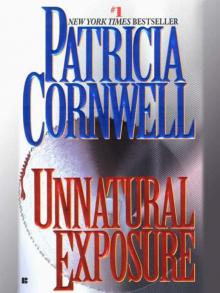 Unnatural Exposure
Unnatural Exposure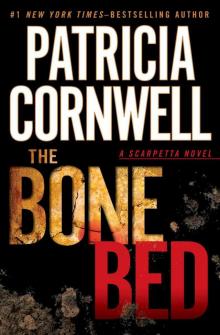 The Bone Bed
The Bone Bed Book of the Dead
Book of the Dead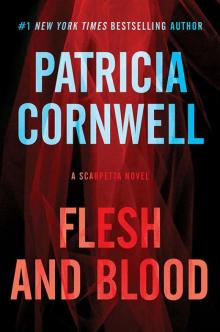 Flesh and Blood: A Scarpetta Novel (Scarpetta Novels Book 22)
Flesh and Blood: A Scarpetta Novel (Scarpetta Novels Book 22)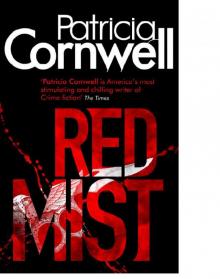 Red Mist
Red Mist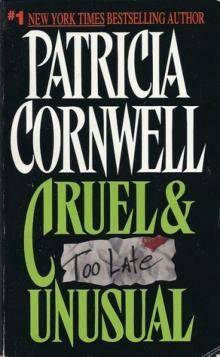 Cruel & Unusual
Cruel & Unusual Hornet's Nest
Hornet's Nest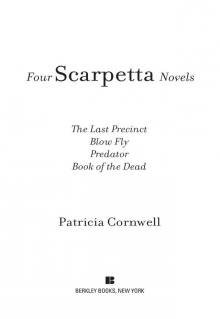 Four Scarpetta Novels
Four Scarpetta Novels Scarpetta's Winter Table
Scarpetta's Winter Table Isle of Dogs
Isle of Dogs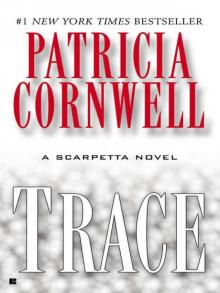 Trace
Trace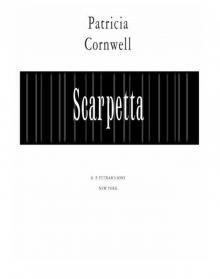 Postmortem
Postmortem Body of Evidence ks-2
Body of Evidence ks-2 Southern Cross
Southern Cross All That Remains
All That Remains Point of Origin
Point of Origin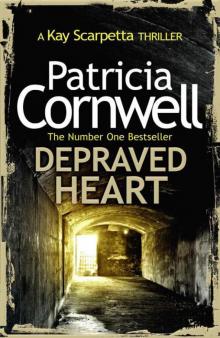 Depraved Heart
Depraved Heart Ruth, a Portrait: The Story of Ruth Bell Graham
Ruth, a Portrait: The Story of Ruth Bell Graham From Potter's Field
From Potter's Field Flesh and Blood
Flesh and Blood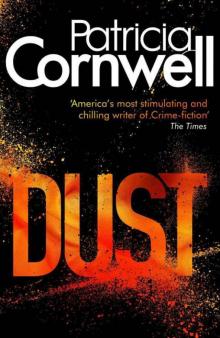 Dust
Dust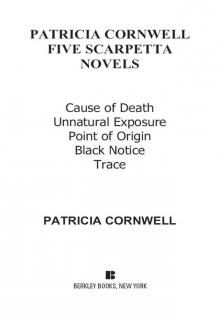 The Body Farm
The Body Farm Port Mortuary
Port Mortuary Quantum
Quantum Portrait of a Killer: Jack the Ripper - Case Closed
Portrait of a Killer: Jack the Ripper - Case Closed Spin (Captain Chase)
Spin (Captain Chase)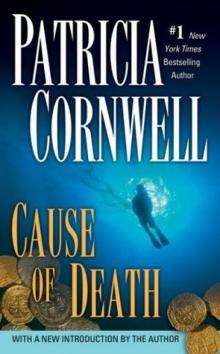 Cause of Death
Cause of Death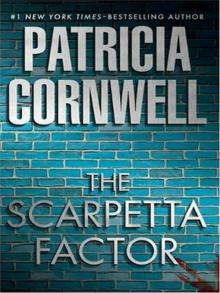 The Scarpetta Factor
The Scarpetta Factor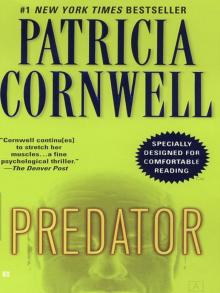 Predator
Predator Scarpetta 18 - Port Mortuary
Scarpetta 18 - Port Mortuary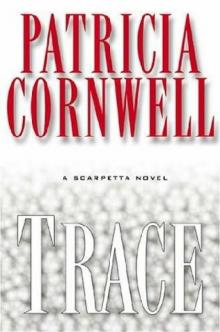 Trace ks-13
Trace ks-13 Portrait of a Killer
Portrait of a Killer Cruel and Unusual ks-4
Cruel and Unusual ks-4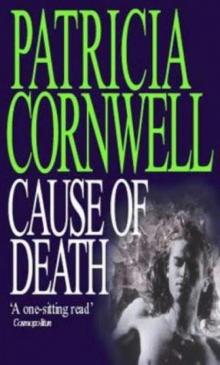 Cause Of Death ks-7
Cause Of Death ks-7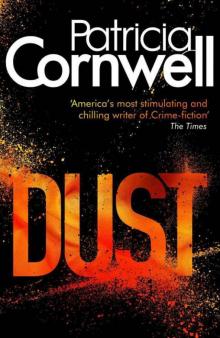 Dust ks-21
Dust ks-21 At Risk wg-1
At Risk wg-1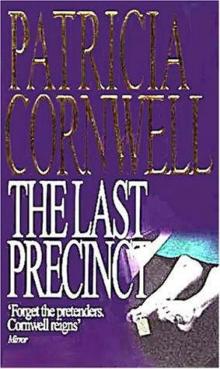 The Last Precinct ks-11
The Last Precinct ks-11 Book of the Dead ks-15
Book of the Dead ks-15 All That Remains ks-3
All That Remains ks-3 Ruth, a Portrait
Ruth, a Portrait Scarpetta's Winter Table (kay scarpetta)
Scarpetta's Winter Table (kay scarpetta) From Potter's Field ks-6
From Potter's Field ks-6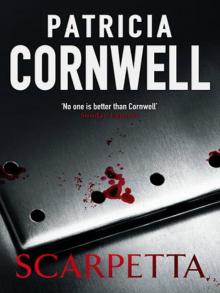 Scarpetta
Scarpetta Isle of Dogs jhabavw-3
Isle of Dogs jhabavw-3 Hornet's Nest jhabavw-1
Hornet's Nest jhabavw-1 The Body Farm ks-5
The Body Farm ks-5 Blow Fly ks-12
Blow Fly ks-12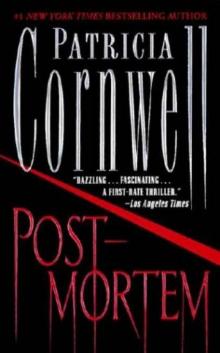 Post Mortem
Post Mortem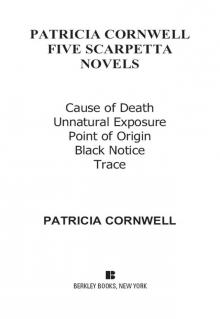 Five Scarpetta Novels
Five Scarpetta Novels Chasing the Ripper (Kindle Single)
Chasing the Ripper (Kindle Single) Point of Origin ks-9
Point of Origin ks-9 Port Mortuary (2010)
Port Mortuary (2010) Unnatural Exposure ks-8
Unnatural Exposure ks-8 Southern Cross uhabavw-2
Southern Cross uhabavw-2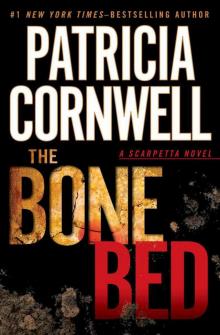 The Bone Bed ks-20
The Bone Bed ks-20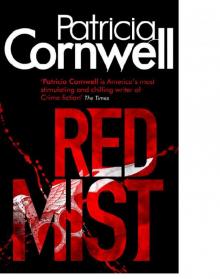 Red Mist ks-19
Red Mist ks-19 Port Mortuary (2010) ks-18
Port Mortuary (2010) ks-18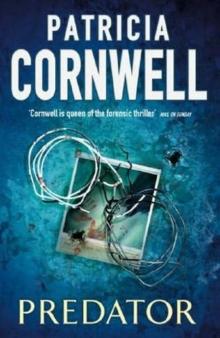 Predator ks-14
Predator ks-14